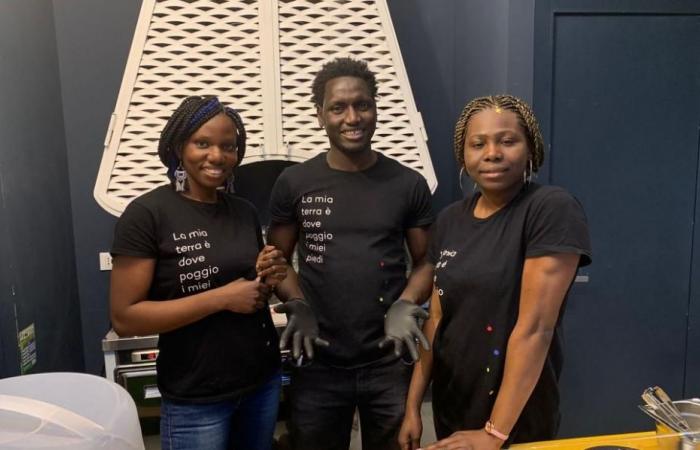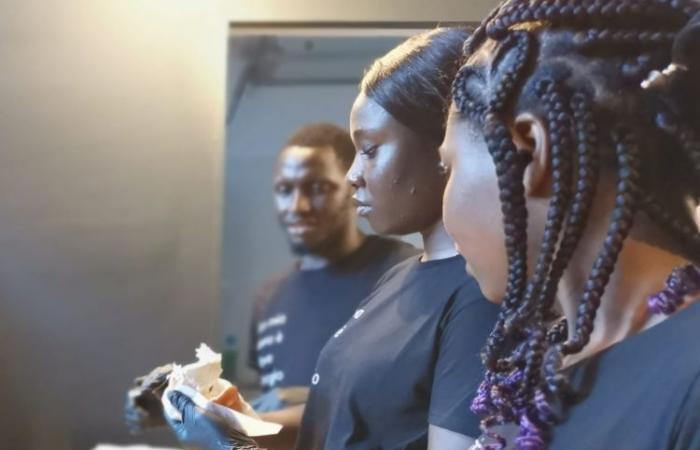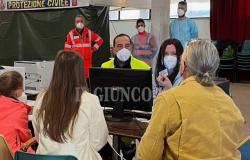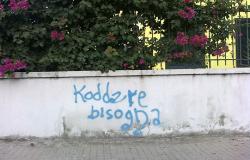In Palermo, the town that surrounds the Ballarò market is a kaleidoscope of ethnic groups, a crossroads of languages and colours, of shouts and songs, of smiles and tears. And within that neighborhood with a thousand human and economic facets, since 2014 there has been a courageous citadel of inclusion, a community project created to transform diversity into wealth for the territory. This is how Moltivolti developed, a social enterprise that promotes food as a tool for dialogue between different people and cultures. The adventure began with the restaurant of the same name Many timescharacterized by an attitude of hospitality outside and inside the dishes: a concrete embrace between Sicilian cuisine and that coming from various Mediterranean countries, from Senegal to Afghanistan, from Tunisia to Palestine… Moltivolti’s chef is from Palermo Antonio Campo, 35 years old, who left behind a degree in architecture to embrace the concept of cuisine without borders, where a dish is not specific to a country but becomes everyone’s. An idea of ”authentic cuisine” that has been certain for a few days that it will be replicated in Mazara del Vallo (Tp).
But Moltivolti in Palermo did not stop at the restaurant, later expanding to a bed & breakfast and on 11 June 2022 it inaugurated BarConi, the first Italian ice cream shop run by migrants. Yes, the name is already strategic and contains “inside” the philosophy of this adventure that began to shake off the past and build a future of hope, autonomy and freedom for those who have never had all this.
The outside of the BarConi ice cream shop with the tables and the mural
«The idea of BarConi – he explains Giovanni Zinna, one of the founding members of Moltivolti – was born during a responsible tourism trip to Senegal. We were looking at the colorful boats of those fishermen and it came naturally to us to reflect on the carts of the sea that pack hundreds of lost souls like gold, putting them at risk among the dangers of the Mediterranean with the illusion of making them land on a new life. We played on the assonance between boats and the ice cream cone and thought we could light a spark of hope by giving a new meaning to that word full of desperation. And so here we are with BarConi celebrating the first 2 years and the dream of making it grow, perhaps transforming it into a franchise throughout Italy. We would like to be a seed to grow almost everywhere.” Technical support and ice cream is to Antonio Cappadoniaone of the Italian masters of this art.
At BarConi the migrants found an opportunity for not only economic but also social redemption
But from September we will study and work so that the project becomes completely autonomous also in the preparation of the raw material. There is another important challenge won with the opening of this ice cream shop: the recovery of Piazzetta Mediterraneo, returned to the community after years of degradation and neglect. First just waste and debris, now order, cleanliness and murals to tell the value of diversity. There are also some tables outside because an ice cream is best enjoyed while sitting while the ice cream shop is an essential space with delicate colours, a large counter and a pastry shop next to it.
Those who work at BarConi have done courses and internships to be not just employees but to become managers of the facility. And in the smiles that welcome you you quickly understand that from the desperation of a boat you have reached the happiness of BarConi. Alagie Malick Ceesay has 23 years old, he is the manager of the ice cream shop and is an example of how work is an opportunity for redemption not only economically but also socially: in Palermo he managed to graduate as an accountant, to rent a house, to cultivate his passion for photography, to become A lot of friends. But he does not forget: «I escaped from Gambia alone at 16 years old and before landing on 30 March 2017 in Pozzallo I traveled for long months amidst difficulties and violence. I crossed Senegal, Mali, Burkina Faso, Nigeria, Libya and I assure you that it was never a pleasure trip: I had no choice. I was hungry for a future, I wanted to build it with study and with my own strength. I was just a kid but I knew this was the time to do it. I didn’t think about the risks I was facing, I just told myself that I had to do it. In Gambia for political reasons only 5% of those who ask get a visa for Europe, which is why I paid 5 times more than a plane ticket and I tempted my luck on makeshift means and then from Libya on the boat” .
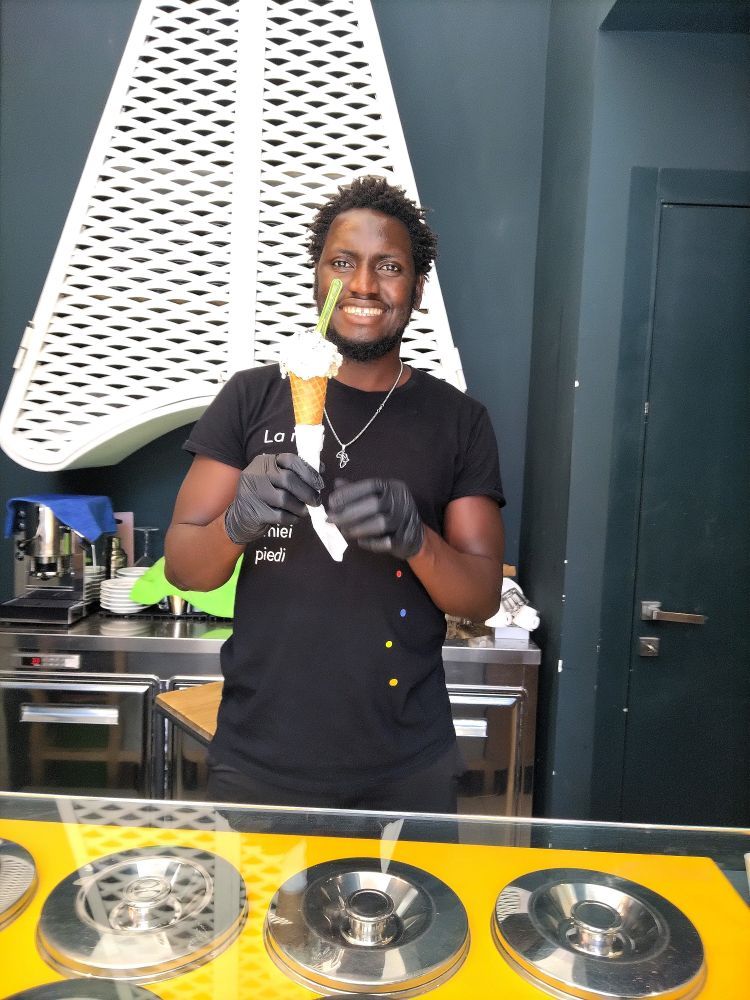
Alagie and my multi-flavored ice cream and stracciatella
Alagie remembers being locked in a room and ferociously beaten in Burkina Faso, having seen his traveling companions killed for no reason in Libya and having exhaustedly ridden the waves on a boat with 500 other people crowded together before hitting land in Italy. Alagie, like all those who work in the Moltivolti team (belonging to around twenty countries), wears a black t-shirt with a significant writing: “my land is where I put my feet”. «As Cicero wrote – underlines Zinna -, where I feel good is my homeland and this means that taking care of the territory and of each other is the best way for everyone to feel better. The biodiversity of cultures is the humus on which we build our activities, convinced that the migrant is not a problem to be solved but a resource for creating a new society. It is wrong to aim for cultural homologation by encouraging them to become like us. We would establish fake relationships without ever making them feel part of the same family. We must leave them the autonomy to express themselves, the differences will become knowledge and added value for us.”
Alagie continues his story: «When I left home I wanted to reach Nigeria to study computer science. On the bus I asked the other passengers where they were going, they all indicated Libya as their destination before reaching Europe. And so I changed my mind too: if everyone wants to go to Europe, I told myself, it will be because there is the certainty of a better destiny for each of us. I wasn’t thinking about Italy, chance brought me here.” And he adds: «In those infernal months of travel I never thought of going back, I was only focused on resisting. If I set myself a goal I want to achieve it, I don’t like to give up or back down. I have no regrets or nostalgia, happiness is doing something I like. And I’m doing it to confirm that life is never a one-way street.” He is happy today, he knows how to manage the place and has learned to make cones which, at the beginning, represented a difficult task but now, however, “it’s what I enjoy the most”.
Tourists also come to the ice cream shop who make the inevitable stop at the Ballarò market and then stop here to ask for an ice cream or even a good Italian coffee. Alagie welcomes them, exchanges a few words and always hopes that that first ice cream will be the inspiration to return. Today there are around sixty cones sold every day, the desire is to multiply them also to give strength and support to a unique project in Italy.
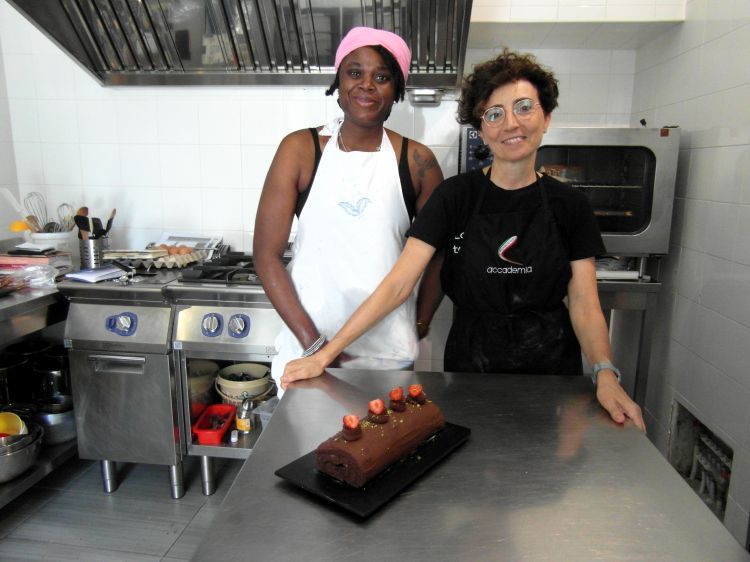
The Nigerian Bridget and the pastry chef Mara smile with the latest creation for the Moltivolti restaurant
«We have classic flavors – underlines Alagie – such as dark chocolate, white chocolate, stracciatella, fiordilatte, hazelnut, those linked to Sicily such as pistachio, mandarin and almond, those made according to the seasonality of the fruit and other details such as salted caramel and many times, the symbol of our philosophy.” Many times it is in fact a “multi-ethnic” taste, many cultures together: there is peanut butter, a fundamental ingredient in the preparation of various African recipes, and there is puffed rice, a cereal present throughout the world, enriched by the scent of lemon, symbol of the Mediterranean. Obviously I try it (combined with stracciatella) and it is better than I already expected, proving that craftsmanship always triumphs. I tell her and her smile widens even more.
«Often we migrants – he explains to me – are considered invisible and as such without rights, including those to move, to work, to choose where to live. I want to be an example for many kids like me and explain to them that with courage and will nothing is impossible. I have found the desire to dream again, one day I will have a family and children who will not go through my suffering.”
They also take turns at the ice cream shop counter Christine Essoh, 29 years old, and Leslie Assie Chacou, 24, both from the Ivory Coast who arrived in Italy by plane but, as they explain with determination, «we too are migrants, with the same difficulties of insertion and integration as those who arrive by boat. The road has been uphill, no one gives you something but that something is even more beautiful if you manage to earn it.” Christine landed in Italy in 2013, pushed by her mother who wanted to give her a future: «I was 17 years old and I aimed to study. But in high school I got pregnant by the man who later became my husband and I dropped out of school. Today I have 3 children aged 8, 6 and 4 and this job is joy and autonomy. I learned many things, the language, even the dialect. And who knows, in 10 years I won’t return to the Ivory Coast to open my own ice cream shop.” Compatriot Leslie smiles, she has a job, friends, a city that loves her and an ice cream that drives her crazy.
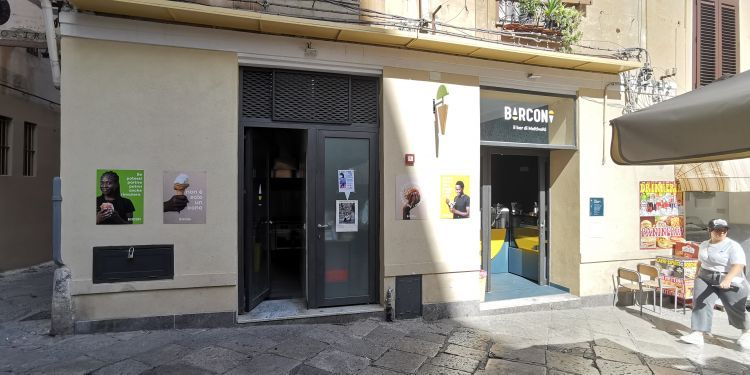
BarConi with, on the left, the pastry shop
In the adjacent laboratory there is the Nigerian Bridget Nne Odiase45 years old, is preparing sesame biscuits with almondsafter having baked a very fragrant one cheesecake which stands behind him. She works alongside Mara Gorgone, 56 years old, architect: 2 years ago she abandoned that profession to become a pastry chef in Moltivolti. «I feel like one of them – she explains – I too chose to start a new life and I did it after the age of 50. I needed to regain control of my time and test myself in a new challenge. I share with them the hope of the future and the freedom of the present. We are a family, we love each other very much and our different backgrounds are the added value that has entered our lives. If you give them trust, they open up to you even in the pain of memories.”
And in fact when, finally, my eyes enter Bridget’s reassuringly everything becomes easier: «I arrived in Lampedusa 8 years ago – she confides to me -. I traveled alone for months and I don’t talk about that boat crossing because it still makes me feel bad. Nigeria is a land without prospects and I still felt too young to give up. I was looking for a future for myself and financial help for my family who remained there. I found the courage to believe it.” Bridget moves her hands with precision and speed, those biscuits take shape one after the other, under Mara’s watchful gaze: «My rebirth began in Palermo. Every day for me is a new step into the future. I have a friend from Palermo, Fabio, who taught me how cultures are a process of becoming and a set of contaminations. For him I learned to cook lasagna with meat sauce, I really like it as well as apple pie. He, however, goes crazy for my rice with chicken while at Christmas I prepared couscous with vegetables for his family.” And when I ask her what else has conquered her about our country, she smiles and replies: «I love Italian music, my favorite singer is Vasco Rossi. After all, I too have had a reckless life.” Each with her journey, each different….
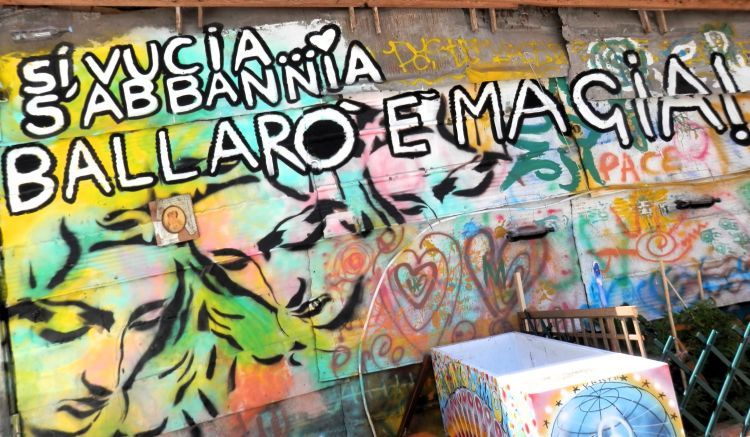
Many ethnic groups, a multiplicity of languages and colors: Ballarò is magic
BarConi, via Benfratelli 7, Palermo www.moltivolti.org

